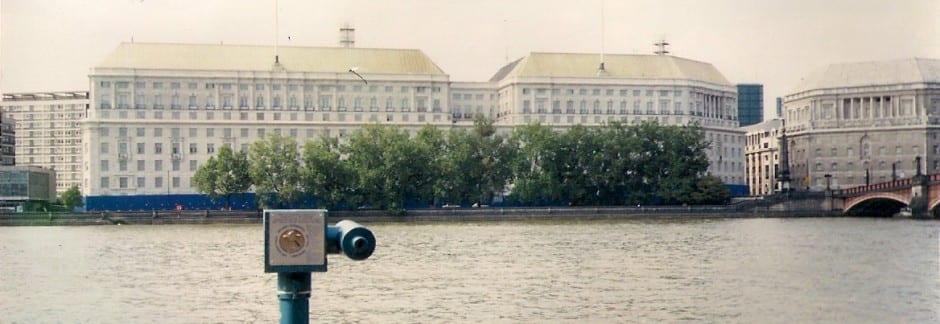The Labour MP, Fiona Mactaggart, has been appointed to the Intelligence and Security Committee to replace the late Paul Goggins , who died in January.
Mactaggart is the first new member of the Committee to be appointed since the ISC was reconstituted as a parliamentary committee under the Justice and Security Act 2013. Under the previous legislative arrangements members of the ISC were appointed by the Prime Minister after consultation with the Leader of the Opposition. This prompted critcisms that a Committee hand-picked by the Prime Minister was too close to the Executive, and not sufficiently independent.
Under the Justice and Security Act members are now appointed by Parliament. However, unlike select committee members who are elected from the whole House, members of the ISC must first be nominated by the Prime Minister, after which Parliament approves their membership. While some have suggested that there is in fact little difference between this and the previous arrangements, others assert that the need to maintain the security of the Committee and its effective working relationship with the intelligence agencies, preclude allowing membership to be open to any Member of Parliament. Members have to be trusted not to leak, and it has been viewed as helpful if they have had experience of handling sensitive information in the past. As a result a large proportion of those who have served on the ISC since it was established in 1994 (22 out of 37 members) have previously held positions as Government Ministers, with a preference for those with Ministerial experience in the Home Office, the Foreign Office, the MoD and the Northern Ireland Office. The current Chair, Sir Malcolm Rifkind, previously served as Secretary of State for Defence and as Foreign Secretary. Paul Goggins had been a Minister in the Northern Ireland Office, before being appointed to the ISC in 2010, and his replacement, Fiona Mactaggart, was Parliamentary Under-Secretary in the Home Office from 2003 to 2006.
The process for appointing members to the ISC continues to be a cause for concern amongst some within Parliament, and Mactaggart’s appointment prompted a fractious exchange of views in the House of Commons between the veteran Labour MP, David Winnick, and members of the ISC. While not objecting to Mactaggart’s appointment, Winnick nevertheless asserted that he was ‘far from satisfied that the method of being nominated in the name of the Prime Minister is the best way for a Member to join the ISC’ :
It is going back to former times. The Leader of the House looks rather puzzled, but he knows full well that a system existed in the previous Parliament whereby names appeared on the Order Paper and we would agree to them or otherwise, as the case may be. I take the view that the ISC should be subject to elections… for membership of the ISC there is no election whatosever. A name is put before us and we either accept or reject it.
Winnick also pointed to the recent report by the Home Affairs Committee, of which he is a long-serving member, which recommended that membership of the ISC should be subject to elections like other select committees and that the Chair should always be a member of an Opposition party.
Winnick’s objections were subject to a pincer movement by two current members of the ISC, the Conservative MP, Dr Julian Lewis and the Labour MP, George Howarth. While Howarth launched an extraordinary personal attack on Winnick, who he claimed had been ‘consistently wrong’ in arguing for greater openess, Dr Lewis offered a blunt appaisal of the trustworthiness of his fellow parliamentarians:
Some people think that we should have some secrets but that there is not a single hon. Member of this House who could not be trusted to know them. If that is one’s view, there would not be any argument against the membership of the ISC being elected just like the membership of any other Committee. However, the membership of this House reflects society in all its varied shades, phases, types and categories. The fact is that I do not think there are many people who would say that, out of 650 Members, there are not at least some who are not quite, shall we say, discreet or tight-lipped enough to share in the most sensitive secrets of the security and intelligence agencies. If one makes that concession, one has to admit that this Committee, if it is going to see such material, has to have some sort of screening process and cannot simply be subject to the ordinary process of election, unless we are content that any single elected Member of this House can, by definition, be trusted not to do something foolish if given access to highly sensitive information.
While this was not the most edifying example of parliamentary debate, the exchange does illustrate the ongoing concerns of some in parliament about the peculiar status of the ISC. This is significant because one of the principal motivations behind the recent reform of the ISC was to enhance its credibility. As the Chair, Sir Malcolm Rifkind, noted in a speech delivered in 2010, reform of the ISC was needed, ‘not simply to secure the independence that we have, but, also, to ensure that it is perceived as such by Parliament and the wider public.’ Continued Parliamentary concerns about the independence of the ISC, and the process and nature of appointments to the Committee in particular, suggest that they may still have some way to go in changing that perception.

Pingback: Some thoughts on the latest appointments to the ISC | Watching the Watchers
Pingback: Jobs for the boys? Women members of the Intelligence and Security Committee | Watching the Watchers
Pingback: Sir Malcolm Rifkind's status as Chair of the ISC | Watching the Watchers